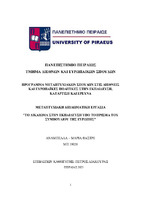Το δικαίωμα στην εκπαίδευση υπό το πρίσμα του Συμβουλίου της Ευρώπης

View/
Keywords
Συμβούλιο της Ευρώπης ; Εκπαίδευση ; Δικαίωμα στην εκπαίδευσηAbstract
This particular thesis was prepared within the framework of the International &
European Policies in Education, Training and Research Program of the Department of
International and European Studies of the University of Piraeus.
The Council of Europe is the most prominent and oldest international organization for
the defense of human rights. It has the mission of observing and safeguarding the
principles of Democracy and the Rule of Law.
Its prestige, values and principles are highly visible at the international, national and
local level. Its contribution through educational policy is important. Education is a
national competence of each state. It is not only a process of acquiring knowledge. It is
a process necessary for the acquisition of social skills and behaviors, values, attitudes
as well as a necessary process of socialization.
The goal of education for the CoE is the promotion of values, peace, democracy, human
rights. Education becomes a means of developing international values and patterns of
behaviour. It becomes a means to fight racism, intolerance, xenophobia and extremism.
Education is an individual and social right. The term right is a power granted to persons
by law to satisfy interests.
The right to education and its relationship with European institutions in general is linked
to access to education, its free nature and the freedom to establish educational
institutions.
The human right to education is particularly important and must be protected. The work
will deal with the protection of the Right in the light of the Council of Europe.
The work consists of 5 chapters. It begins with a historical overview of the Council of
Europe. The institutional structure and extra-treaty bodies are presented, as well as the
leading legal text, the European Conventionof Human Rights-ECHR and the European
Court of Human Rights - ECtHR. The term Education is examined, a necessary
reference to conclude the study of the concept of the Right to Education. Then in the
third chapter the National framework and article 16 of the Constitution are studied, as
well as in the fourth the practices of the CoE and the Jurisprudence. We will see how
this right is protected by the institutions and the European Court of Human Rights -
7
ECtHR. Finally, cases of the Court are studied through bibliographic references and the
Jurisprudence in the context of the SC. Cases related to Greece are studied as well as
whether these policies are implemented in practice.
In the fifth chapter, a brief reference is made to the necessity of teaching human rights
that are the basis of human existence, the dignity that leads to the active citizenship of
the citizen of tomorrow. The Recommendation of the Committee of Ministers of the
Council of Ministers calls for the integration of the teaching of human rights in the
curricula of all levels aiming at a culture of human rights. The CoE attaches great
importance to Youth, the future of society and the citizens of tomorrow.
Human Rights Education is a "distinct human right".


